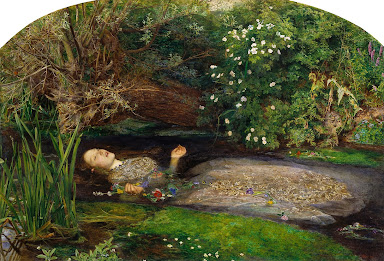Just before the equinox in 1819, a 24-year-old John Keats wrote the ode "To Autumn." There is a good chance that you read it in some English class. It appears in almost every literature anthology.
He wrote in a letter about the day that inspired the poem. "Somehow a stubble plain looks warm — in the same way that some pictures look warm — this struck me so much in my Sunday's walk that I composed upon it."
Keats did not consider 1819 to be a great year, particularly for his poetry life. He wrote to his brother, "Nothing could have in all its circumstances fallen out worse for me than the last year has done, or could be more damping to my poetical talent."
That's ironic because now most critics call that year his "Great Year," or "Fertile Year" because Keats wrote almost all his great poetry that year. In the spring and summer, he had written "Ode to a Nightingale," "Ode to a Grecian Urn," and "Ode to Psyche." The last of the odes was "To Autumn.
Keats died from tuberculosis less than two years later at age 25.
 |
"This grave contains all that was Mortal of a Young English Poet Who on his Death Bed,
in the Bitterness of his Heart at the Malicious Power of his Enemies
Desired these Words to be engraven on his Tomb Stone:
Here lies One Whose Name was writ in Water. " |
To Autumn
by John Keats
Season of mists and mellow fruitfulness,
Close bosom-friend of the maturing sun;
Conspiring with him how to load and bless
With fruit the vines that round the thatch-eves run;
To bend with apples the moss'd cottage-trees,
And fill all fruit with ripeness to the core;
To swell the gourd, and plump the hazel shells
With a sweet kernel; to set budding more,
And still more, later flowers for the bees,
Until they think warm days will never cease,
For summer has o'er-brimm'd their clammy cells.
Who hath not seen thee oft amid thy store?
Sometimes whoever seeks abroad may find
Thee sitting careless on a granary floor,
Thy hair soft-lifted by the winnowing wind;
Or on a half-reap'd furrow sound asleep,
Drows'd with the fume of poppies, while thy hook
Spares the next swath and all its twined flowers:
And sometimes like a gleaner thou dost keep
Steady thy laden head across a brook;
Or by a cyder-press, with patient look,
Thou watchest the last oozings hours by hours.
Where are the songs of spring? Ay, Where are they?
Think not of them, thou hast thy music too,—
While barred clouds bloom the soft-dying day,
And touch the stubble-plains with rosy hue;
Then in a wailful choir the small gnats mourn
Among the river sallows, borne aloft
Or sinking as the light wind lives or dies;
And full-grown lambs loud bleat from hilly bourn;
Hedge-crickets sing; and now with treble soft
The red-breast whistles from a garden-croft;
And gathering swallows twitter in the skies.
more about the poem




















